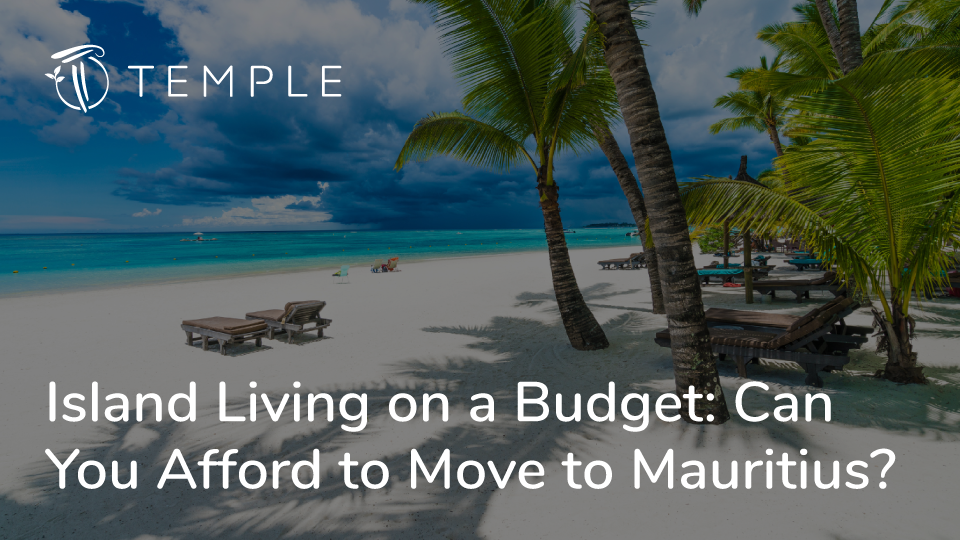Unveiling the Cost of Paradise: Mauritius vs. South Africa & France
Idyllic tropical life is a dream for most – nomads, families and professionals alike are all seeking that balanced life, but how does the Mauritian dream stack up financially? Let’s dive into the latest data (May 2024) to compare the cost of living in Mauritius with South Africa and France across essential categories.
Essentials:
- Fuel: Mauritius sits between the two. A litre of gasoline is roughly 20% more expensive than South Africa but 30% cheaper than France.
- Groceries: Here’s where things get interesting. Basic staples like bread, potatoes, and onions are slightly cheaper in Mauritius compared to South Africa. However, red meat and fish are generally dearer on the island. Cooking oil is a close call, with minimal price difference between the three countries.
- Beverages: Bottled water is a steal in Mauritius compared to France, but slightly pricier than South Africa. Alcoholic drinks come at a premium, with import taxes, vat etc. Reaching around 30% on import (pre-mark up for retail).
Numbers Don’t Lie:
Here’s a quick breakdown of estimated costs for some key groceries (averages may vary depending on brand and location):
| Item | Mauritius (₨) | South Africa (ZAR) | France (€) |
| Loaf of Bread | 40 | 18 | 1.50 |
| Kilo of Potatoes | 40 | 15 | 1.80 |
| Kilo of Onions | 35 | 12 | 1.20 |
| Liter of Cooking Oil | 120 | 85 | 2.00 |
| Kilo of Beef | 800 | 220 | 12.00 |
| Kilo of Fish | 280 | 180 | 10.00 |
| Liter of Bottled Water | 35 | 15 | 0.80 |
| Bottle of Beer | 70 | 45 | 2.50 |
Beyond the Basics:
- Healthcare: Here’s a significant difference. France boasts a robust public healthcare system, with Mauritius offering a mixed system (public and private). South Africa’s public system faces challenges, making private insurance more common. Overall, Mauritius falls at the bottom between the three in terms of cost, with France being the most expensive but most reliable. Whilst South Africa is built on Medical Aid, Mauritius offers Insurance products (Health Insurance, not aid – maybe this gives more comfort as aid tends to allude to a handout!) which is treated as annual insurance governed by insurance legislation locally. That being said, many South Africans still benefit from their local provider (Discovery Africa, as an example) whilst living in Mauritius.
- Rentals: Finding an apartment is pricier in Mauritius compared to South Africa and the initial startup costs are around 4 x the rental amount. It is important to note that in Mauritius, both the landlord and lessee are obliged to pay agent’s commission + VAT and usually a 2 months deposit plus 1 month rental is required upfront. France takes the crown for the most expensive rentals.
- Vehicles: Purchasing a car in Mauritius is generally cheaper than France, but pricier than South Africa. Car insurance is paid annually and is generally cheaper than South Africa, but pricier than France. Importation of vehicles to Mauritius is extremely expensive and is, in most cases, only worth it for serious, vintage or other collectors.
- Entertainment: Restaurant meals and leisure activities are tourist centric all around the island and therefore are more expensive in Mauritius compared to South Africa. France is undeniably the priciest for entertainment.
We explored the living costs in Mauritius, but what about education? Here’s the current status on schooling systems and costs in this island nation (as of May 2024):
The Mauritian Schooling Landscape:
Mauritius boasts a multi-tiered schooling system with four main sectors:
- Pre-primary (optional): Caters to children aged 3-5 years. Costs vary depending on the institution, but private pre-primary schools can be expensive.
- Primary (compulsory): Free and compulsory for all children aged 6-11 years. Public schools follow the British system with English as the primary language.
- Secondary (compulsory up to 16): Also free and compulsory, offering academic and vocational streams. Public schools follow the British system, while some private schools offer alternative curriculums like the International Baccalaureate (IB) or the French education system.
- Tertiary: Includes universities, technical schools, and vocational institutions. Offers diverse programs with varying costs depending on the institution and program chosen.
Cost Considerations:
While public primary and secondary education are free, there are some associated expenses:
- Uniforms: Mandatory in most schools, adding a yearly cost.
- Stationery and textbooks: May require some student contribution, although the government provides textbooks for Grades 1-9 since 2020 for Government Schools.
- Transportation: Most schools offer an outsourced licensed van facility at an additional cost per month per child.
Private School Price Tag:
Private schools offer a different experience, with costs varying significantly:
- French schools: Typically, more expensive than British-system schools.
- International schools: Offering IB or other international curriculums, these are often the priciest option, with monthly fees ranging from 15 000 – 50 000 Mauritian rupees (MUR) or even exceeding this.
Finding the Right Fit:
Choosing a school system depends on your priorities and budget. Public schools offer a quality, free education, while private schools might provide a smaller class size, a specific curriculum, or a more international environment, but at a cost.
Further Research:
- Explore the Ministry of Education & Human Resources website (https://education.govmu.org/SitePages/Index.aspx) for details on the public education system.
- Research individual private schools for specific fee structures and curriculum details (Corporate Support Services can also guide you and advise a list of schools to consider depending on the region you will reside in. Drop us a note on [email protected] )
The Verdict:
Mauritius offers a middle ground between the affordability of South Africa and the higher costs of France. While groceries and fuel might be slightly cheaper on the island compared to South Africa, housing, healthcare, and some entertainment options come at a premium.
Remember: These are averages, and your individual lifestyle will significantly impact your cost of living. Consider your priorities – healthcare, proximity to the beach, or a vibrant nightlife – when choosing your Mauritian dream.
Contact our immigration team for a free 30minute consultation to make your move to Mauritius a reality: [email protected]





